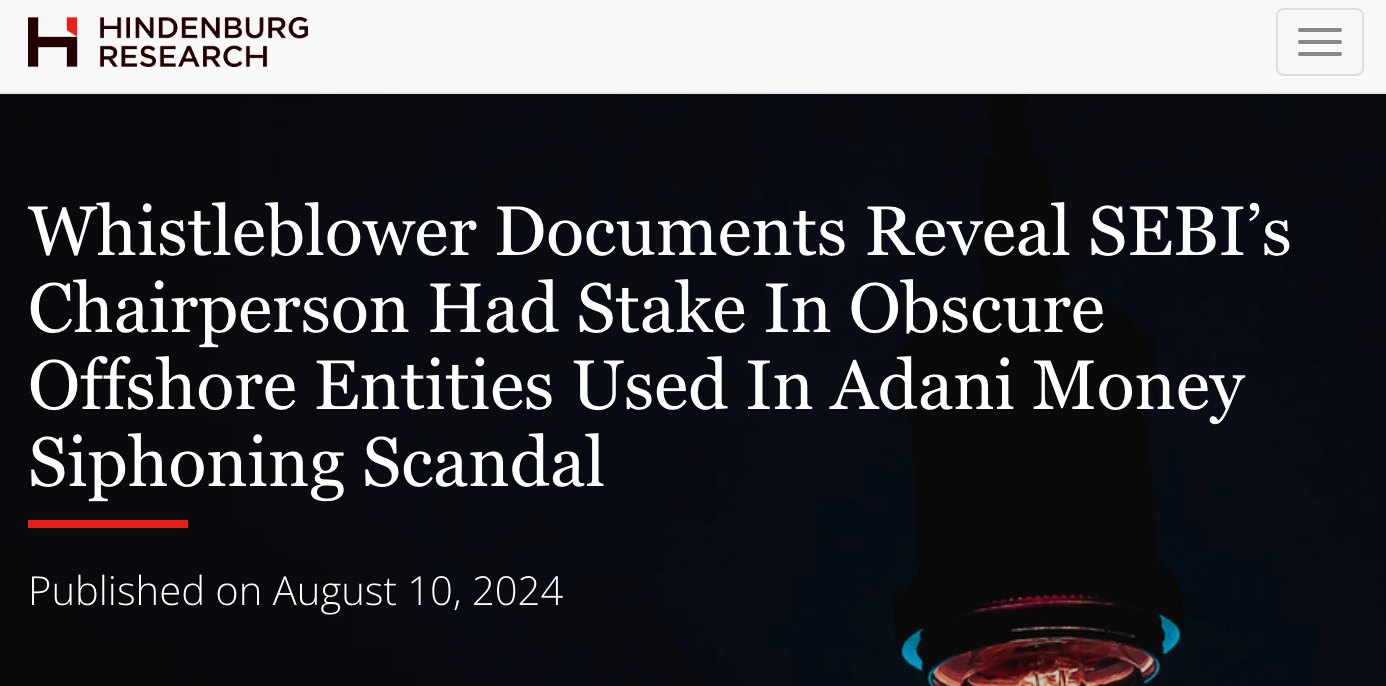In the world of finance, accountability and transparency are not just buzzwords—they are the bedrock of the system. Yet, as the latest Hindenburg report reveals, these principles remain elusive for some of the largest players in the global market. The Adani Group, once again, finds itself at the centre of a maelstrom of accusations and controversy. This time, the spotlight is on India’s financial regulator, the Securities and Exchange Board of India (SEBI), raising serious questions about its role and effectiveness in holding Adani accountable.
Hindenburg Research, known for its investigation exposing Adani of fraud, corruption and money laundering in January 2023, has once again peeled back the layers of corporate obfuscation to reveal the rot within. Their latest report points to SEBI’s systemic failures in scrutinising and regulating the Adani Group’s financial activities. They expose SEBI’s fundamental breach of its responsibilities. The report outlines how SEBI, under its current leadership, has been complicit and grossly negligent in its oversight of Adani’s questionable financial dealings.
How can a company like Adani, repeatedly flagged for its financial misconduct, continue to operate with impunity?
The answer, it seems, lies in the disturbing proximity between SEBI’s leadership and Adani’s top brass. Central to this scandal is Madhabi Puri Buch, the current chief of SEBI, who is accused of having links to offshore funds that have been reportedly used by the Adani Group, raising serious questions about the integrity of SEBI’s oversight.
Hindenburg finds that SEBI, under Ms. Buch’s leadership, may have failed to properly investigate and regulate the offshore entities connected to Adani, entities that are suspected of engaging in manipulative practices to inflate stock prices and mask the conglomerate’s true financial state.
The allegations have already led to Adani’s market value losing billions, and India’s opposition taking to the streets and demanding Buch’s resignation and a probe into SEBI’s conflict of interest with Adani.
The financial sector must drop Adani
With mounting evidence of the Adani Group’s unscrupulous activities, and the shocking failure of SEBI to act, financial institutions have a clear choice to make. Will they continue to turn a blind eye, thereby endorsing a coal conglomerate that has repeatedly shown complete disregard for transparency and accountability? Or will they finally take a stand against one of the most toxic players in the market today?
Let’s be clear: by financing Adani’s latest so-called ‘green bond,’ the financial sector has already failed its first test following Hindenburg’s initial revelations. With detailed investigations from Hindenburg, OCCRP, Snowcap, and others laying bare the extent of Adani’s misconduct, continuing to invest in bonds issued by any Adani group entity is no longer just poor judgment – it is a clear endorsement of a company that operates with impunity, undermines regulatory frameworks, and manipulates markets to its advantage.
Financial institutions that persist in their support for Adani are not just ignoring the evidence; they are actively participating in the perpetuation of financial and environmental harm on a global scale.
